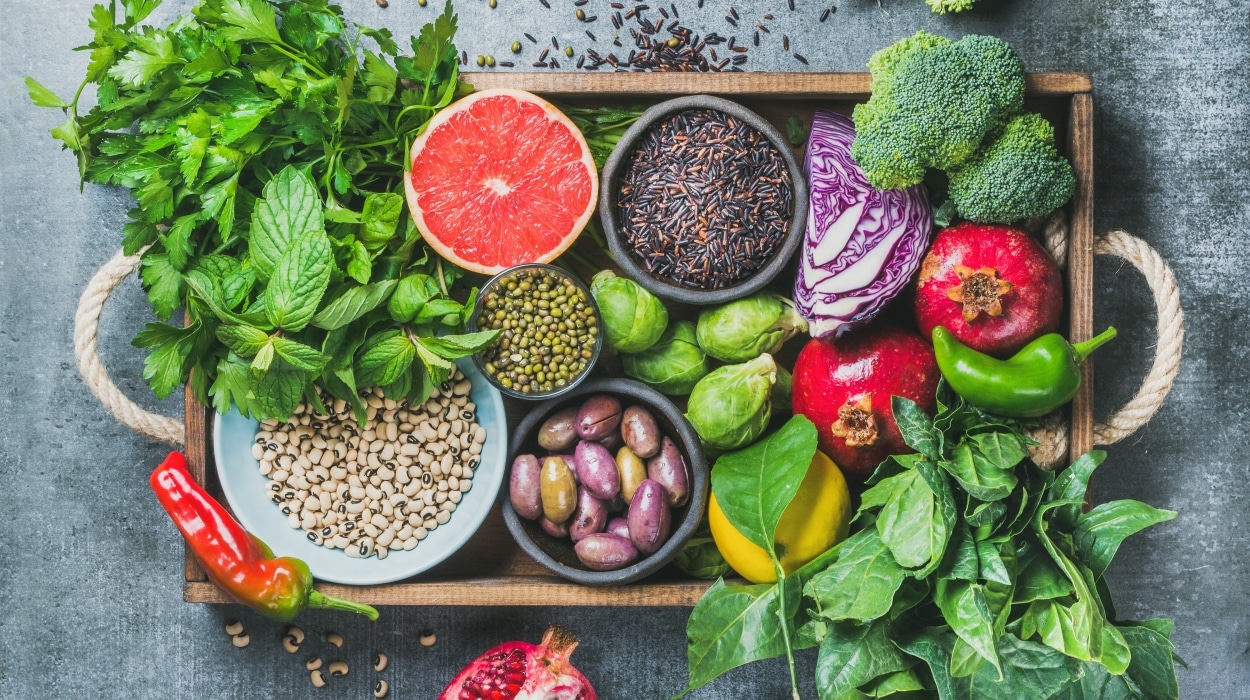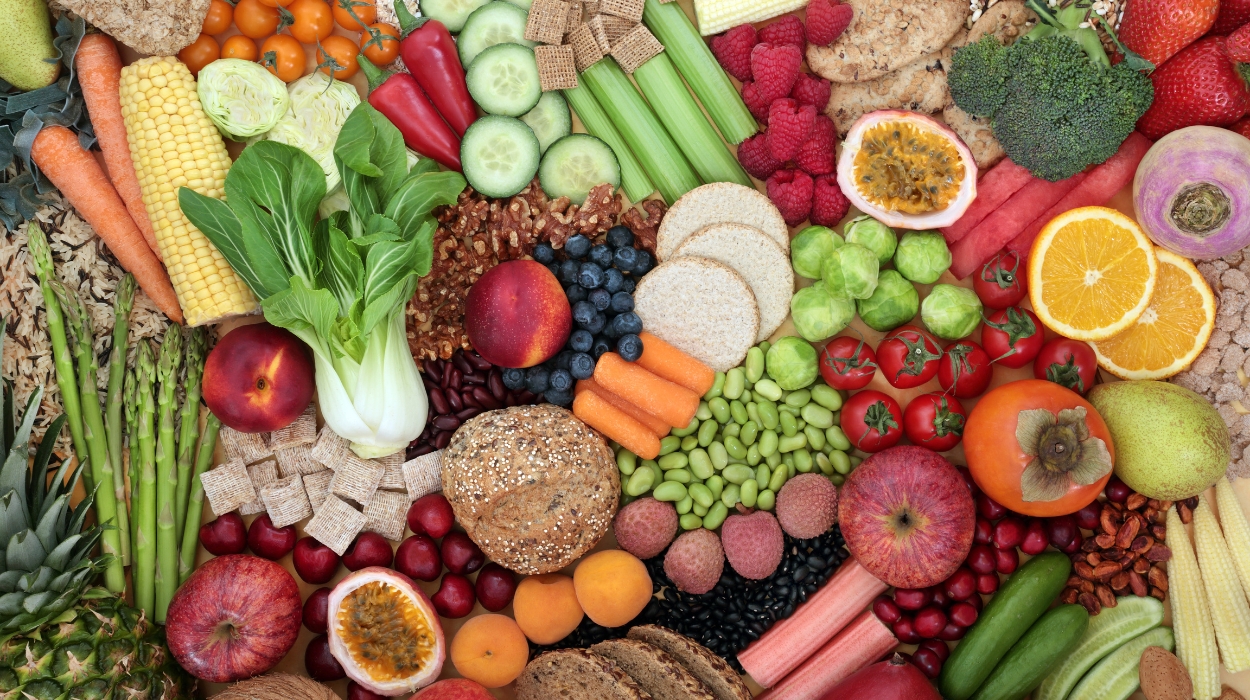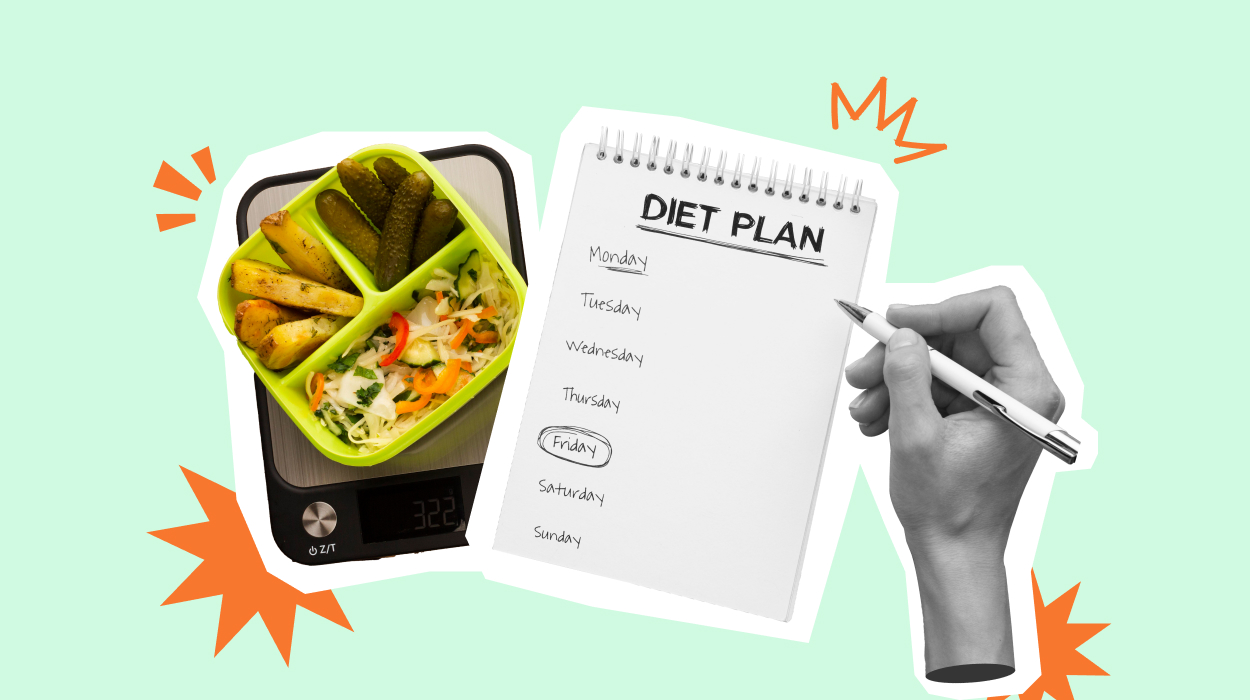If you are vegetarian for health reasons or do not agree with eating meat due to ethics, you can still lose weight by creating and sticking to a vegetarian weight-loss meal plan. The principles are the same as any other diet and involve the general aim of expending more calories than you consume.
Of course, you do not need a vegetarian weight loss plan, but it does make it easier to prepare nutrient-rich foods and stick to a diet without constantly wondering what your next meal should consist of.
A plan can also help you balance your meals, allowing you to obtain the maximum nutrition on each day of your weight loss journey. So if you want to lose weight on a vegetarian diet, then read this guide to help get you started.
Healthy Vegetarian Diet Plan For Weight Loss
Vegetarian Diet For Weight Loss: Five-Day Sample Plan
Embarking on a vegetarian diet for weight loss can be a nutritious and effective approach. Here’s a sample meal plan to help you achieve your goals while enjoying delicious and satisfying meals.
Monday: NutriVitality Delight (approx. 1050 calories)
Start your week with a burst of energy and nourishment with the NutriVitality Delight meal plan. Remember to stay hydrated with plenty of water throughout the day to support your journey towards a more vibrant, nutritious you.
| Breakfast | |
| Porridge oats (with or without milk) with some honey | One bowl |
| Lunch | |
| Greek salad made with tomatoes, lettuce, chopped cucumber, kalamata olives, feta cheese (optional); served with olive oil and lemon juice dressing | One serving |
| Multi-seeded bread | Two slices |
| Cold-pressed fruit juice | One glass |
| Dinner | |
| Lentils with roasted vegetables | One serving |
| Fruit salad dessert made from fruits of your choice | One cup |
| Snacks | |
| Walnuts | One ounce |
| Pumpkin seeds | One ounce |
| Blueberries | Half a cup |
Tuesday: Vitalizing Harmony (approx. 1150 calories)
Experience a day of nourishing and delicious meals with the Vitalizing Harmony plan which is designed to provide balance, flavor, and the vitality you deserve.
| Breakfast | |
| Fruit smoothie consisting of strawberries, bananas, blueberries, skimmed milk, and low-fat Greek yogurt | One serving |
| Lunch | |
| Wild rice with fried chestnut mushrooms and courgettes | One serving |
| Dinner | |
| Whole wheat pasta with a rich tomato sauce | One serving |
| Snacks | |
| Plums | One medium fruit |
| Apples | One medium fruit |
| Dates | Four fruits |
Wednesday: Nutrient-Rich Vitality (approx. 900 calories)
Indulge in a day of wholesome and nutrient-rich eating with the Nutrient-Rich Vitality plan. This meal plan is designed to keep you energized, satisfied, and nourished from dawn to dusk.
| Breakfast | |
| Low-fat Greek yogurt with blueberries | One serving |
| Lunch | |
| Vegetable smoothie made with kale, spinach, broccoli, and flaxseeds | One bowl |
| Dinner | |
| Baked sweet potatoes with courgettes | One serving |
| Snacks | |
| Brown bread | Two slices |
| Cherry tomatoes | Half a cup |
| Cucumber sandwich | One serving |
| Hazelnuts | One ounce |
Thursday: Nutrient-Boosting Balance (approx. 1200 calories)
Welcome to the Nutrient-Boosting Balance, a day dedicated to nourishing your body with a harmonious blend of flavors and nutrients. This meal plan strikes the perfect balance between taste and nutrition, supporting your weight loss journey.
| Breakfast | |
| Oatmeal with cinnamon and nuts | One bowl |
| Lunch | |
| Pitta bread with peanut butter and a banana | One serving |
| Dinner | |
| Boiled black-eyed peas with spinach, olive oil, and lemon juice | One serving |
| Snacks | |
| Fruit salad | One cup |
| Brown bread with hummus | Two slices |
Friday: Vitality Renewed (approx. 1000 calories)
The Vitality Renewed Day is designed to replenish your body with a blend of wholesome foods that will leave you feeling refreshed and energized.
| Breakfast | |
| Toast with peanut butter | Two slices |
| Lunch | |
| Vegetable soup | One serving |
| Dinner | |
| Red lentil pasta with spinach, broccoli, and quinoa | One serving |
| Snacks | |
| Pears | One medium-sized fruit |
| Cherries | One cup |
| Almonds | One ounce |
| Apricots | Three fruits |
What Is The Vegetarian Diet For Weight Loss?
A vegetarian diet is a way of eating that is predominantly made up of consuming only plant-based foods. These include nuts such as walnuts and almonds, seeds such as pumpkin and sunflower seeds, legumes such as lentils and blacked-eyed peas, and whole grains such as brown rice and quinoa. These mostly provide vitamins, minerals, protein, and carbs.
Another major part of a vegetarian diet is, of course, fruits and plenty of vegetables. These add further phytonutrients such as flavonoids and carotenoids to the diet. All these protein-rich foods help to create a balanced diet if they are included in a healthy vegetarian diet plan.
Some vegetarians also consume eggs, cheese, and milk, but all other animal food sources, including seafood and poultry, are excluded from the diet.
Types Of Vegetarian Diet For Weight Loss
Vegan Diet

Veganism is growing in popularity, especially among the younger generation. Influences include health, environmental issues, and the prevention of cruelty to animals. Vegans stick strictly to plant-based foods and even exclude milk, cheese, honey, and eggs from their diet. This means that vegans do not consume any products that originate from animals at all.
Ovo-vegetarian Diet
Ovo-vegetarians are similar in their eating habits to vegetarians. However, the major difference here is that the only animal-based foods an ovo-vegetarian consumes are eggs. This means that ovo-vegetarians can also consume egg-based products such as noodles.
The inclusion of eggs does bridge the gap when it comes to protein and B vitamin needs. Even though eggs and products that contain eggs are allowed, this form of vegetarianism still lags behind in popularity when compared to a traditional vegetarian diet.
Lacto-vegetarian Diet
This diet is still mainly plant-based, but the major difference is that eggs are not consumed. However, other dairy products such as yogurts, cheeses, butter, and milk can all be included in this particular diet.
Lacto-ovo-vegetarian Diet
A lacto-ovo-vegetarian diet is similar to a lacto-vegetarian diet because it mainly consists of vegetables, legumes, fruits, seeds, grains, and nuts. It does, however, allow the inclusion of dairy products, but eggs are included here as well. Meat, fish, and poultry are still excluded.
Pros Of A Balanced Vegetarian Diet For Weight Loss
Good For Cardiac Health
Vegetarian-based diets have been linked to lower incidences of certain diseases, such as cardiovascular disease. It is thought that this is linked to the low saturated fat intake of such diets and also the protective effects of the phytonutrients provided in vegetarian foods.
However, it is still important for vegetarians to balance their fat intake to make sure they are getting enough healthy fats from olive oil and linseed oils and to limit the use of cheap processed oils that often are labeled as vegetable oils.
Olive oil provides the body with vitamin E and monounsaturated fatty acids.
Linseed oil provides omega-3 fats,[1] and both can lower your risk of heart disease because they are healthy fats.
Reduced Risk Of Obesity
Vegetarian diets that include very few highly processed foods tend to be low in calories as well. Natural vegetarian foods such as lentils, beans, seeds, and vegetables have few calories when compared to processed foods. They also have lower amounts of saturated fat content as well.
Because a vegetarian diet mostly consists of the types of vegetarian food mentioned above, exceeding the daily calorie intake allowance is harder than eating both plant and animal-based nutritious foods, including processed meats and dairy products.
A study showed that omnivores[2] are more likely to be overweight or obese when compared to those who eat less meat or no meat at all. The high fiber content of plant-based foods also helps to boost weight loss, as fiber makes us feel fuller for longer, aids the digestive process, and improves the body’s response to insulin.
Lowers Cholesterol
Plant sterols in spreads, yogurts, and drinks have been used to lower cholesterol successfully. However, plant-based diets have also been shown to help lower cholesterol levels in omnivores who have raised cholesterol. Vegetarian foods high in soluble fiber, such as oats and walnuts, are particularly useful in lowering overall cholesterol levels in the blood. They do this by decreasing the amount of cholesterol that is absorbed by the body.
Reduced Cancer Risk

Because vegetables, fruits, legumes, nuts, and seeds are packed full of nutrients and powerful antioxidants, eating these foods daily results in high levels of antioxidants continuously being available in the blood to fight free radicals[3] and prevent oxidative stress. This can trigger a number of diseases in humans, including various cancers. Plant-based diets are thought to be particularly beneficial in preventing the development of colon and prostate cancers.
Reduced Risk Of Stroke
Since the benefits of plant foods when compared to animal foods include the lowering of cholesterol levels and a boost to cardio health, the knock effect of these and obesity prevention means that the risk of suffering a stroke is reduced. This is because obesity, heart disease, and high cholesterol are all stroke risk factors.
Cons Of A Weight-Loss Vegetarian Diet
Consuming Too Many Carbs
Some vegetarians tend to eat too many carbs in the form of vegetables and fruits. This is especially the case for vegans. Those who include dairy, eggs, and fish can get their protein from these food groups. Vegans should consume more healthy nuts such as walnuts, seeds, and lentils to boost their protein and fat intake.
Vitamin B12 Deficiency
One of the best sources of vitamin B12 is red meat. This vitamin helps create red blood cells and helps to prevent anemia. However, those who follow a vegan diet for the health benefits associated with plant-based eating can end up vitamin B12 deficient. Supplementation and consuming fortified vitamin B12 foods such as cereals can help maintain healthy levels.
Calcium Deficiency
Dairy products such as milk and yogurts contain high levels of calcium. Those who omit these from their diets could become deficient in this vital mineral. However, broccoli, kale, and other green leafy vegetables, if eaten regularly, along with tofu and calcium-fortified cereals, can redress the balance.
Vitamin D Deficiency
Along with calcium, vitamin D is vital for good bone health and is mostly found in dairy products. The best source of this vitamin is the sun, but in winter, vegans should take a supplement.
Fighting Hunger
Those who were once meat eaters but became vegetarians often suffer from feeling hungry continuously. This also affects those on any kind of food-related weight loss meal plan. Hunger can be combated when on a vegetarian weight loss meal plan by eating complex carbs such as oats and brown rice. These are digested slowly, and the fiber content makes you feel fuller for longer. Snacking on nuts, seeds, and dried fruit can also fill in the gaps between meal times.
Conclusion
Eating a mainly plant-based diet has its advantages and disadvantages, but the health benefits outweigh problems such as certain vitamin deficiencies. These can be rectified with supplements.
A plant-based diet can lead to healthy losing weight, and you can lose weight quicker if you avoid processed vegetarian meals. This is due to there being fewer calories in fruits, vegetables, legumes, and other whole foods.
Vegetarian diets supply the body with antioxidants that can help prevent certain diseases, such as cancers, from developing. Furthermore, they lower the risk of developing heart disease, high cholesterol, and type 2 diabetes and can even prevent strokes and obesity.
Frequently Asked Questions
Vegetables and other foods allowed in a vegetarian diet cost a fraction of the price of many meat products.
Yes, you can, but only if you consume too many calories.
Yes, it is recommended to supplement vitamins D and B12, as well as calcium.
While they can, it is best to let children eat eggs, fish, and dairy products to aid normal development.
 Expert's opinion
Expert's opinion
